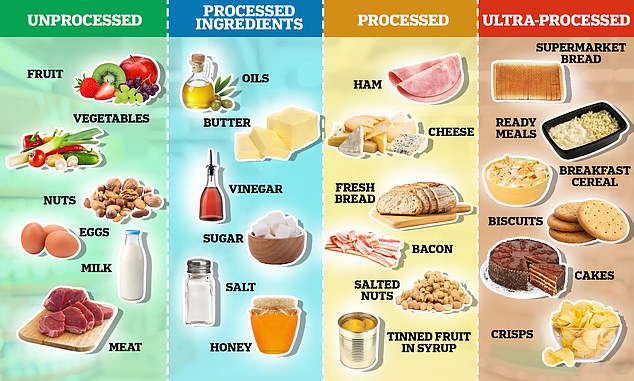Sugary drinks and processed meats are the only two ultra-processed foods associated with an increased risk of heart attacks and strokes, Harvard researchers have found.
Scientists used data collected from nurses and healthcare professionals to assess the risk of cardiovascular disease, heart disease and stroke from eating a variety of different ultra-processed foods.
But while they’ve long been vilified, not all ultra-processed foods (UPFs) are created equal.
In fact, yogurt, whole-grain bread and salty snacks have been shown to slightly reduce the risk of disease.
Sugary drinks and processed meats are the only two ultra-processed foods associated with an increased risk of heart attacks and strokes, Harvard researchers found.

The Nova system, developed by scientists in Brazil more than a decade ago, divides foods into four groups based on the degree of processing they have undergone. Unprocessed foods include fruits, vegetables, nuts, eggs and meat. Processed culinary ingredients, which are not typically consumed on their own, include oils, butter, sugar and salt.
UPF They make up 57 per cent of the average UK diet – the category includes soft drinks, crisps, bacon and breakfast cereals.
An easy sign that a food might be a UPF is if it contains ingredients you wouldn’t find in your kitchen cupboard, such as unrecognizable colors, sweeteners, and preservatives.
Another clue is the amount of fat, salt and sugar hiding inside each packet, and UPFs often contain high amounts.
But supermarket staples like breakfast cereals and packaged bread can be mass-produced and are also considered ultra-processed.
This is because they often contain additional ingredients such as emulsifiers, artificial flavors and sweeteners, instead of just flour, salt, yeast and water.
However, the study published in The Lancet this week suggests that we should “deconstruct” the classification of ultra-processed foods as Many of the UPFs have a ‘‘diverse nutritional composition’ and therefore have cardiovascular benefits.
UPF intake was assessed using food frequency questionnaires in three studies.
The researchers analysed data from the NHS Nurses’ Health Study of 75,735 nurses aged 30 to 55, a second Nurses’ Health Study of 90,813 women aged 25 to 42, and a Health Professionals Follow-up Study of 40,409 men aged 40 to 75.
Those with previous cardiovascular disease, cancer or a high BMI were excluded from the study.
A selection of UPF foods was divided into ten groups: bread and cereals; sauces, spreads and condiments; packaged sweet snacks and desserts; packaged savoury snacks; sugar-sweetened beverages; processed red meat, poultry and fish; ready-to-eat/heat mixed meals; yoghurt/dairy-based desserts; hard liquor; artificially sweetened beverages.
They found that there was a risk associated with consuming a diet rich in sugary and artificially sweetened beverages and the risk of suffering from cardiovascular diseases.
This risk was also found in diets rich in processed meats, such as sausages, bacon and hot dogs.
However, inverse associations were observed for bread, breakfast cereals, yogurt, dairy desserts, and salty snacks.
The study’s authors said that consumption of processed meats and soft drinks should be especially discouraged because of their consistent adverse association with cardiovascular disease, coronary heart disease and stroke.
But they stress that reducing the sodium, saturated fat and added sugar content of some of these UPFs may enhance some of the “cardioprotective benefits” of the vitamins, minerals and fiber found in some of these products.
They add that reducing non-essential cosmetic additives in wholemeal bread could also increase its health benefits.
Yogurt and dairy-based desserts were also found to have only positive or neutral cardiovascular benefits, especially in the case of fermented plain yogurt.
The study authors noted that this was despite the generally high content of saturated fats and added sugars in dairy products. They added that yoghurts containing probiotic bacteria or odd-chain fatty acids may contribute to reducing cardiovascular risk despite being a sun protection factor.
Professor Gunter Kuhnle, a food scientist and nutritionist at the University of Reading, posted a graph from the study on X explaining that the data showed that most of the UPF food groups “actually protect and reduce disease risk”.
“The big problem is that many foods are classified as UPF,” she told MailOnline.
‘Most studies show that people who consume a lot of soft drinks, especially sugar and sweetened beverages, are more likely to be obese and suffer from diabetes, as well as other diseases.
‘The data shows a huge impact from sugary drinks and processed meat, while everything else is very neutral.’
For example, bread sold in supermarkets is often classified as UPF, but Professor Kuhnle explains that it can still be healthy.
He said: ‘Wholemeal bread is probably a healthy form of bread, whether it’s made in a large factory or homemade, the difference between the two will be minimal.’


